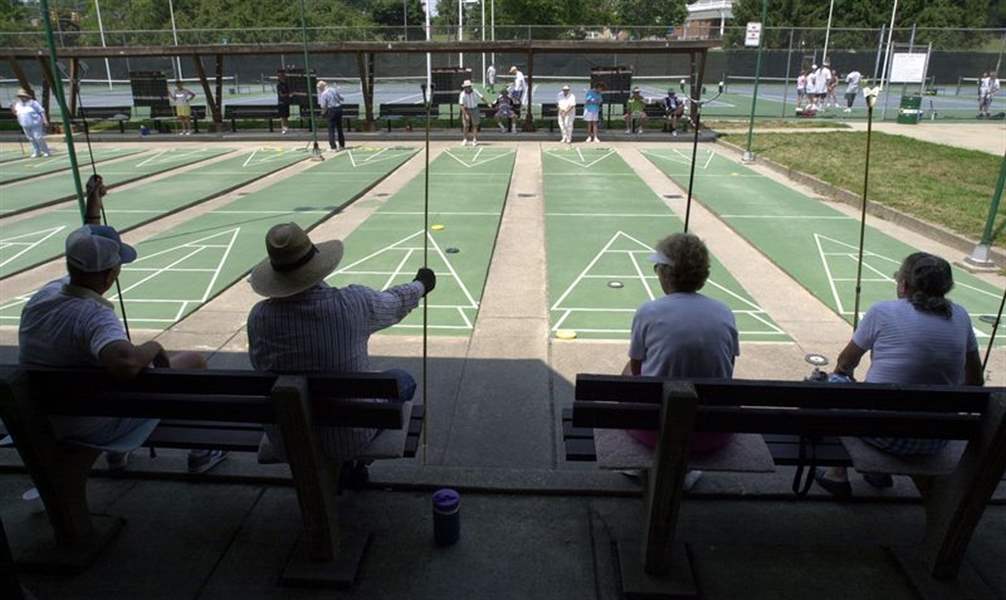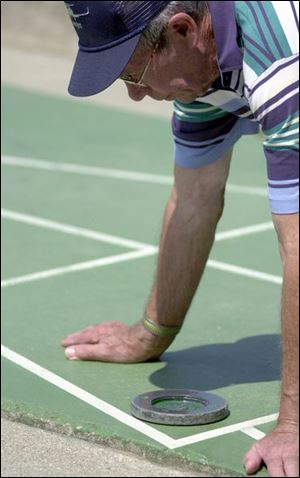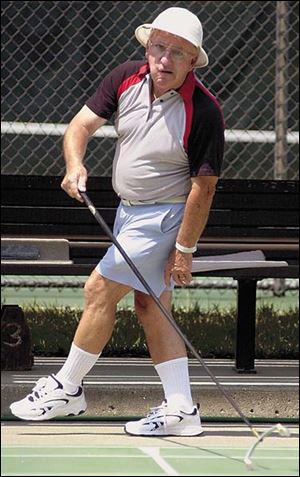
Companionship, competition part of passion for shuffling
8/1/2001
Contestants watch and size up the competition while awaiting turns during the tournament at Jermain Park.
They carry six-foot sticks, and they know how to use them.
They speak politely to one another, but they stare down the court with steely concentration. They wear sunscreen and sensible shoes.
More than 50 “shufflers” competed in the Ohio and Michigan Shuffleboard Association's Singles Tournament, held Monday and yesterday at Jermain Park.
The competitors came from courts throughout the region to stand in the sun, slide a stick down smoothed cement, and send colored discs just far enough to score.

Tournament director Gerald Houdeschell checks the lie of a shot to see whether it's good. He ruled the shot no good.
They are retirees and “snowbirds” - locals who spend summers here and winters down South. Most are grandparents. Once their games are over, they sit quietly in the shade, watching the survivors battle it out.
They do it for companionship, some say. To keep in shape. To keep their competitive juices running strong.
“It's very competitive, but there's a wonderful camaraderie, too,” said tournament director Gerald Houdeschell.
Like most of the people here, he and his wife, Betty, discovered shuffleboard at a retirement community in Florida - a state that claims 25,000 card-carrying shufflers in its state club.
“We've made some friendships that will probably last the rest of our lives,” he said.
The game comes from England, he said, and lends itself to shipboard entertainment. It landed in the United States in the 1920s and took root in St. Petersburg, Fla.
From there, it spread throughout the United States and Canada, often traveling northward with retirees who enjoy it while vacationing.

Joseph Messier of Ft. Myers, Fla., uses a little body English to try to guide his shot.
The Houdeschells brought a passion for shuffling back with them to Findlay, and they now play each week at a club in Bluffton.
Shuffleboard's appeal is simple, he said. “Anybody can play. You don't have to be a big, husky athlete, but you do have to have some real skill and mental attitude. And it doesn't cost much of anything. There's not a lot of money involved.”
Membership in a shuffleboard club costs $5 per year, and tournament winnings rarely top $100.
A shuffle cue, which players use to shove the discs, is not so inexpensive. Made of fiber glass or aluminum and are much more, they come in models with names like Rol-A-Glide, Big Foot, and Continental. Few cost more than $30. A set of eight plastic shuffle disks, each the size of a saucer, can set you back $40 or $50.
“Don't even call them pucks,” Mr. Houdeschell warned. “This is not hockey. This is a game of serious skill and finesse.”
He watched as his wife, Betty, squinted into the afternoon sun as she sized up her next shot. A little woman, she wore a neat white cotton shirt and pale yellow shorts, round sunglasses, and a sparkly sun visor.
Beside her sat a tough contender: a sizeable woman in a sky-blue ensemble. Her straw hat was lashed to her head with a length of floral ribbon. She did not smile; her eyes were invisible behind wraparound lenses.
Her name is Wilma Rudolph. She's the biggest point-holder in the Ohio women's singles division. She and her husband, “Red,” travel between Texas and Mount Gilead, Ohio, each season. They're off to Australia soon to compete in an international tournament.
Wilma Marvin, a retiree from Adrian, watched the ladies battle it out under the hot sun. “Look at the people around us,” she said. “We're the lucky ones. We do this for recreation, for fun. But we're all in good health. There are so many people younger than us who are in a lot worse shape.”
“It's really not a sport,” added June Schubert of Bryan. “It's exercise. It's a big family. We shuffle up here all summer, and in the winter we go down to Florida and see these same people in tournaments there.”
She said she loves the egalitarian nature of shuffleboard, and the polite-but-cutthroat competitiveness.
“I've always been really competitive,” she said. “You ought to see me play cards. And if I lose a match, so what? There's another tournament next weekend.
“There are so many scenarios to this,” he continued. “You have to figure out which one is the best to play ... and the person standing next to you might be a millionaire, and you'd never know it. No one asks. Everyone who shuffles is down-to-earth.”